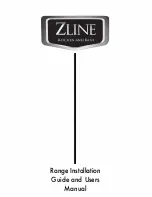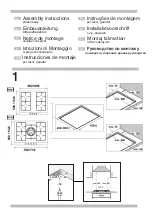
9
Multi-function Oven Functions
(Fig.2.11)
Fan Oven
This function operates the fan and the heating
element around it. An even heat is produced
throughout the oven, allowing you to cook large
amounts quickly.
Fan oven cooking is particularly suitable for baking on several
shelves at one time and is a good ‘all-round’ function. It may
be necessary to reduce the temperature by approximately
10 °C for recipes previously cooked in a conventional oven.
If you wish to preheat the oven, wait until the indicator light
has gone out before inserting the food.
Fanned Grilling
This function operates the fan whilst the top element
is on. It produces a more even, less fierce heat than a
conventional grill. For best results, place the food to
be grilled, on a trivet over a roasting tin, which should be
smaller than a conventional grill pan. This allows greater air
circulation. Thick pieces of meat or fish are ideal for grilling in
this way, as the circulated air reduces the fierceness of the
heat from the grill.
The oven door should be kept closed while grilling is in
progress, so saving energy.
You will also find that the food needs to be watched and
turned less than for normal grilling. Preheat this function
before cooking.
For best results we recommend that the grill pan is not
located on the uppermost shelf.
Fan Assisted Oven
This function operates the fan, circulating air heated
by the elements at the top and the base of the oven.
The combination of fan and conventional cooking
(top and base heat) makes this function ideal for cooking
large items that need thorough cooking, such as a large meat
roast.
It is also possible to bake on two shelves at one time,
although they will need to be swapped over during the
cooking time, as the heat at the top of the oven is greater
than at the base, when using this function.
This is a fast intensive form of cooking; keep an eye on the
food cooking until you have become accustomed to this
function.
Conventional Oven (Top and Base Heat)
This function combines the heat from the top and
base elements. It is particularly suitable for roasting
and baking pastry, cakes and biscuits.
Food cooked on the top shelf will brown and crisp faster than
on the lower shelf, because the heat is greater at the top of
the oven than at the base, as in ‘Fan Assisted Oven’ function.
Similar items being cooked will need to be swapped around
for even cooking. This means that foods requiring different
temperatures can be cooked together, using the cooler zone
in the lower half of the oven and hotter area to the top.
The exposed top element may cook some foods too quickly,
so we recommend that the food be positioned in the lower
half of the oven to cook. The oven temperature may also need
to be lowered.
Browning Element
This function uses the element in the top of the oven
only. It is a useful function for the browning or
finishing of pasta dishes, vegetables in sauce,
shepherds pie and lasagne, the item to be browned being
already hot before switching to the top element.
Base Heat
This function uses the base element only. It will crisp
up your pizza or quiche base or finish off cooking the
base of a pastry case on a lower shelf. It is also a
gentle heat, good for slow cooking of casseroles in the
middle of the oven or for plate warming.
The Browning and Base Heat functions are useful additions
to your oven, giving you flexibility to finish off items to
perfection.
Defrost
This function operates the fan to circulate cold air
only. Make sure the temperature control is at 0°C and
that no heat is applied. This enables small items such
as desserts, cream cakes and pieces of meat, fish and poultry
to be defrosted.
Defrosting in this way speeds up the process and protects
the food from flies. Pieces of meat, fish and poultry should
be placed on a shelf, over a tray to catch any drips. Be sure to
wash the shelf and tray after defrosting.
Defrost with the oven door closed.
Large items, such as whole chickens and joints should not be
defrosted in this way. We recommend this be carried out in a
refrigerator.
Defrosting should not be carried out in a warm oven or when
an adjoining oven is in use or still warm.
Make sure that dairy foods, meat and poultry are completely
defrosted before cooking.












































